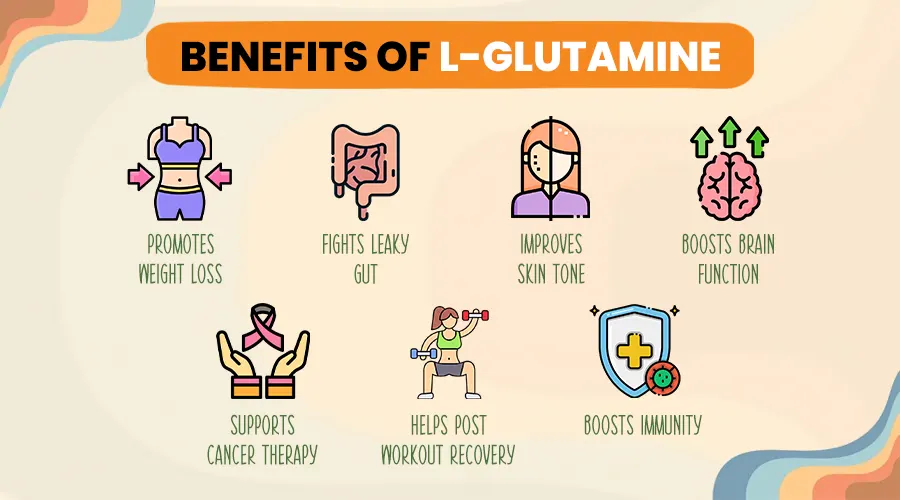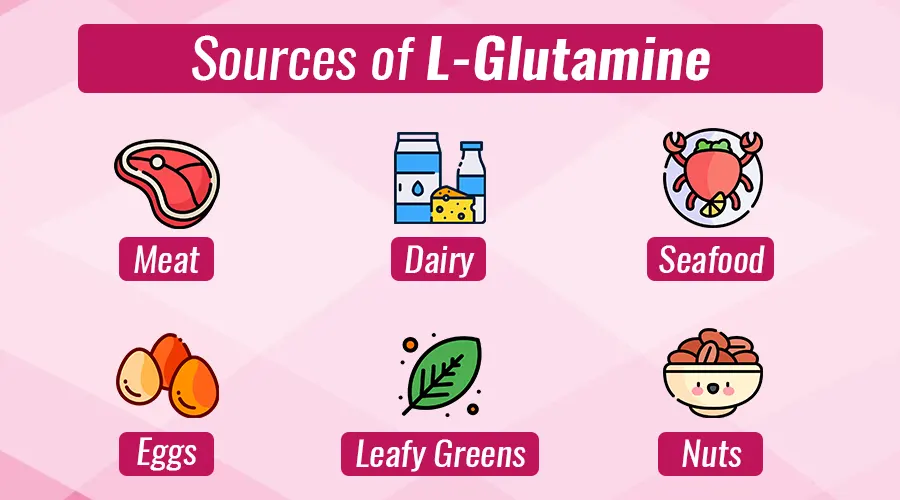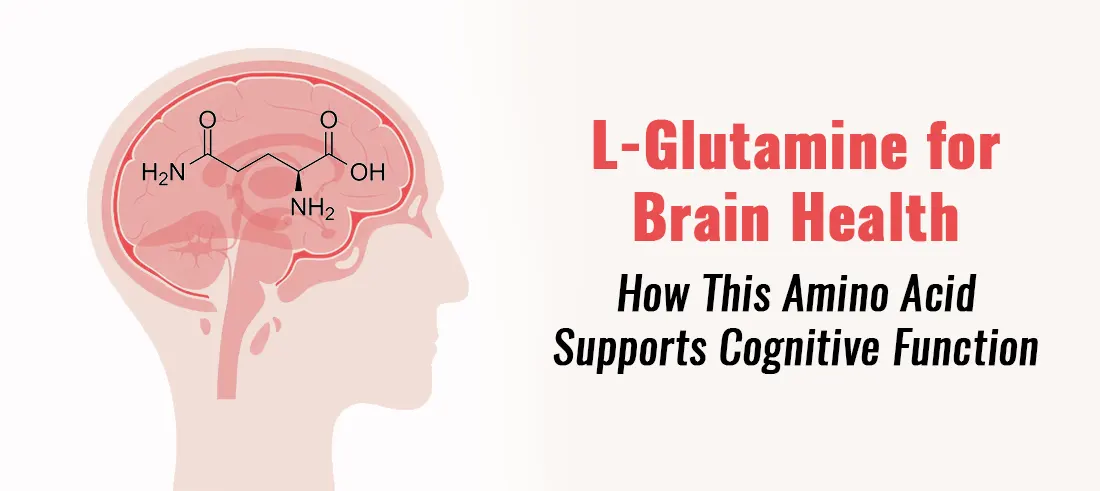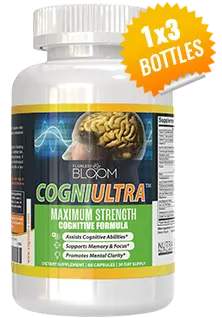Understanding L-Glutamine: The Basics
L-Glutamine is a vital amino acid, often described as a building block of protein, and plays a crucial role in maintaining overall health.
It’s the most abundant amino acid in the body. It primarily resides in muscles but you can also find it in the blood and various organs.
Though classified as a nonessential amino acid—meaning our body can produce it—there are times, especially under stress or illness, when the body’s demand for glutamine surpasses its ability to produce it.
So, what is L-Glutamine good for?
One of L-glutamine’s significant roles is in protein synthesis. Proteins are essential for repairing tissues and maintaining muscle mass – perfect for athletes and anyone recovering from injuries.
Additionally, glutamine fuels the immune system. It provides energy to immune cells, so they combat infections and heal wounds efficiently.
L-glutamine is also good for gut health. It strengthens the intestinal barrier by nourishing the cells lining the gut, so harmful substances don’t leak into the body.
Want Better Memory And Mood? Find Out How L-Glutamine Helps!
The Connection Between Gut Health and Brain Health
 L-glutamine health benefits
L-glutamine health benefitsThe gut and brain share a profound connection known as the gut-brain axis, a complex communication network that links your digestive system with your central nervous system. A 2015 study on GBA notes;
The gut-brain axis (GBA) consists of bidirectional communication between the central and the enteric nervous system, linking emotional and cognitive centers of the brain with peripheral intestinal functions. – Marilia Carabotti, et al.
This connection, the study notes, is not just metaphorical; it’s a real, dynamic interaction where emotions, thoughts, and physical states travel between your gut and brain.
It’s like a two-way highway where signals constantly flow, influencing everything from mood to digestion.
The study further notes that at the heart of this connection is the vagus nerve, a critical component that serves as a major communication line between the gut and brain.
This nerve helps manage numerous bodily processes and can affect how we feel both mentally and physically. The study notes;
Evidence indicates that microbiota communication with the brain involves the vagus nerve, which transmits information from the luminal environment to CNS.
When the gut is happy, it sends positive signals to the brain, contributing to a balanced mood and clearer thinking.
Another key player is the gut microbiome, the vast community of microbes living in the digestive tract.
These tiny organisms produce neurotransmitters like serotonin and gamma-aminobutyric acid (GABA), which help regulate mood and anxiety.
A healthier gut microbiome means a more balanced production of these chemicals; good news for your mental health and cognitive function.
All in all, the study notes that gut health can directly impact cognitive abilities. A well-functioning gut helps reduce inflammation, which, if left unchecked, can negatively affect the brain and cause conditions like depression and anxiety.
L-Glutamine’s Role in Neurotransmitter Regulation
L-Glutamine is essential for brain health, primarily due to its role as a precursor to important neurotransmitters like glutamate and gamma-aminobutyric acid (GABA). GABA in brain function is crucial for regulating neuronal excitability and reducing stress. Glutamate, according to a 2021 study, plays a key role in cognitive processes, including learning and memory.
Glutamate is an excitatory neurotransmitter with several types of receptors found throughout the central nervous system, and its metabolism is important to maintaining optimal levels within the extracellular space. As such, it is important to memory, cognition, and mood regulation. – Mia Michaela Pal.
On the other hand, GABA is inhibitory, working to calm the brain and reduce feelings of anxiety. The balance between these neurotransmitters is crucial for maintaining a stable mood and clear mental function.
Moreover, the glutamine health benefits go beyond neurotransmitter synthesis, as it also contributes to overall cognitive function.
When neurotransmitter levels are balanced, our ability to concentrate, remember, and process information is enhanced, leading to improved clarity and decision-making.
Potential Cognitive Benefits of L-Glutamine Supplementation
Research indicates that L-glutamine supplementation can protect against cognitive decline, especially under stress. Studies involving animal models have shown that L-glutamine helps maintain the balance of neurotransmitters in the brain, which is crucial for memory and learning. We took a keen interest in a 2021 study, which noted that this balance is vital for preserving cognitive function and preventing mild cognitive impairment.
Further investigations led us to a 2024 study that notes that L-glutamine supplementation may help improve cognitive performance by reducing oxidative stress and inflammation in the brain. This amino acid supports neurotransmitter synthesis, contributing to better mental clarity and sharper memory.
Improve Your Brain Health Naturally With L-Glutamine. Find Out How!
L-Glutamine Benefits For The Elderly
Why L-Glutamine is Relevant for the Elderly
Natural glutamine production by the body decreases as we grow older. Reduced glutamine production through aging leads to different age-related challenges which result in muscle decline weakened immune functionality and digestive system problems.
Maintaining enough levels of L-glutamine stands as an essential priority to support both health outcomes and quality of life because the elderly face greater risks of these health conditions.
Key Benefits of L-Glutamine for the Elderly
Improved Muscle Health:
Sarcopenia appears naturally throughout aging because older people experience the progressive decline of their muscle mass and strength. L-glutamine supports protein synthesis, which is essential for preserving muscle tissue. L-glutamine serves elderly exercisers along with those undergoing rehab through its beneficial properties.
Enhanced Immune Function:
Immune functions deteriorate frequently in older adult populations. Through its support of white blood cell metabolism L-glutamine helps strengthen the immune system while protecting against infections.
Gut Health Support:
The elderly are at a higher risk of gut-related issues such as leaky gut syndrome. L-glutamine helps maintain the intestinal lining, reducing inflammation and improving nutrient absorption.
Energy Production and Recovery:
Fatigue often accompanies aging. By aiding in cellular energy production, L-glutamine helps reduce tiredness and supports quicker recovery from illness or exercise.
Wound Healing and Recovery:
L-glutamine accelerates wound healing and recovery after surgeries, a critical need for many elderly individuals. Its role in tissue repair ensures faster recovery and improved resilience.
These benefits make L-glutamine a valuable ally for promoting healthy aging.
Sources of L-Glutamine: Dietary and Supplemental Options
L-glutamine is readily available in a variety of foods. Here are some top natural sources of L-glutamine:
 Sources of L-Glutamine
Sources of L-Glutamine- Meats: Chicken, beef, lamb, turkey, and pork are rich in glutamine, making them excellent choices for those looking to boost their intake.
- Seafood: Fish and shellfish like mackerel, sardines, and shrimp also provide a significant amount of this amino acid.
- Dairy Products: Milk, cheese, and yogurt are great options for dairy lovers, offering a good dose of glutamine.
- Eggs: A staple in many diets, eggs provide a healthy amount of glutamine along with other nutrients.
- Plant-Based Sources: Tofu, kidney beans, and nuts such as almonds and cashews are excellent for those following a plant-based diet.
- Vegetables: Red cabbage and dark leafy greens like spinach and kale are packed with glutamine and other essential nutrients.
While many people get enough glutamine from their diet, supplementation might be necessary in certain situations.
Athletes, individuals under high stress, or those recovering from illness or surgery may benefit from L-glutamine supplements to meet higher demands. Always talk to your doctor before hopping on.
Safety and Side Effects of L-Glutamine Use
L-Glutamine is generally safe for most people when consumed through a balanced diet. However, like any supplement, taking it in larger doses can come with potential risks and side effects. Some individuals might experience mild digestive issues, such as
- Stomach pain
- Bloating, or nausea.
It’s important to monitor for any adverse reactions and seek medical advice if they occur.
Certain groups should exercise caution or avoid L-glutamine supplements. Individuals with kidney or liver disease should be particularly careful; their bodies may struggle to process the additional amino acid load.
Pregnant or breastfeeding women are advised to avoid supplementation due to limited research on its effects in these populations.
On the flip side, certain people may benefit from L-glutamine supplementation. Athletes, for instance, might find it useful due to their increased protein and amino acid needs for muscle repair and recovery.
Likewise, those recovering from surgery or illness, where the body’s demand for glutamine may exceed what is naturally produced, can consider supplementation under medical guidance.
Future Research Directions on L-Glutamine and Brain Health
The exploration of L-glutamine’s role in brain health is still in its infancy. This, therefore, leaves several intriguing questions unanswered.
Current research, as we’ve seen throughout the article, highlights its potential to protect against cognitive decline and support neurotransmitter balance. Yet, detailed mechanisms remain elusive.
One area researchers could consider is understanding how L-glutamine supplementation influences brain plasticity and long-term cognitive outcomes.
While studies suggest benefits in stress models, in our experience, real-world applications and dosage guidelines are not well-established.
Future research should focus on L-glutamine’s impact on specific cognitive disorders and its interplay with other brain health nutrients like zinc.
Investigating its role in neuroprotection and recovery post-injury or surgery could open doors to therapeutic applications.
Additionally, long-term studies on safety and efficacy in diverse populations will help form comprehensive guidelines.
Explore L-Glutamine’s Role In Brain Health And Cognitive Support
FAQs
Can L-Glutamine supplementation help with anxiety or depression?
L-Glutamine supports the production of GABA, an inhibitory neurotransmitter that helps calm the brain and reduce feelings of anxiety. Balanced neurotransmitter levels may also improve mood and reduce symptoms of depression.
Is L-Glutamine suitable for vegetarians and vegans?
Yes, L-Glutamine is available in plant-based foods such as tofu, beans, nuts, and leafy greens. Additionally, vegan-friendly L-Glutamine supplements derived from non-animal sources are widely available.
Can L-Glutamine protect against age-related cognitive decline?
Preliminary research suggests that L-Glutamine may help reduce oxidative stress and inflammation, both of which are associated with age-related cognitive decline. However, more studies are needed to confirm these effects.
Conclusion
And that, folks, wraps up our review of L-glutamine – a key player in brain health. We’ve touched on what glutamine does – its crucial role in neurotransmitter regulation, its cognitive benefits, and how it can be sourced from both diet and supplements. While generally safe, being aware of potential side effects is important.
We’ve also established that the future of L-glutamine research holds great promise, showing the potential to enhance cognitive function further.
Try using cognitive supplements that have L-Glutamine in their ingredients, for instance, CogniUltra®. This supplement is a well-rounded formula that not only provides L-Glutamine but also incorporates other mind-boosting ingredients like Bacopa Monnieri, Ginkgo Biloba, and Phosphatidylserine, which are known for their potential to support memory, focus, and overall cognitive function. Additionally, its blend of antioxidants and adaptogens aims to reduce mental fatigue and enhance brain performance under stress.
Once that is done, proceed to consult with your doctor to see if it fits your needs,. This, if done correctly, is a necessary step towards a brighter, sharper mind.




